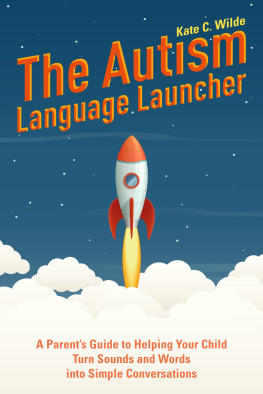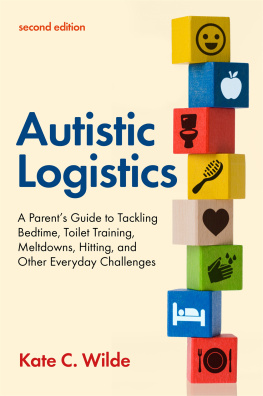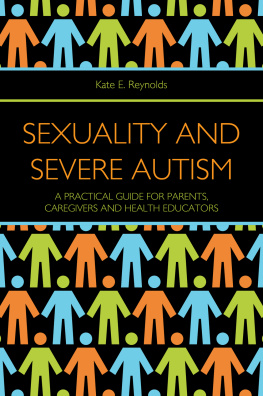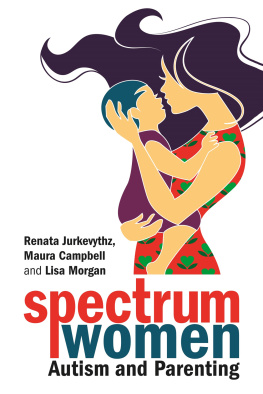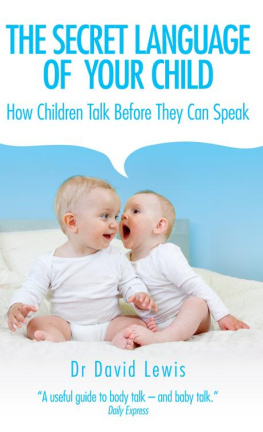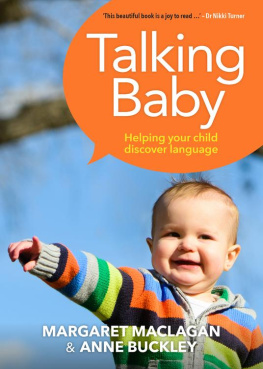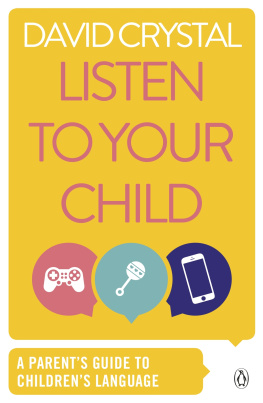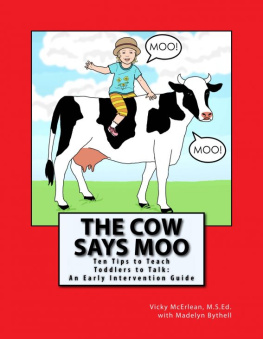
The Autism
Language
Launcher
A Parents Guide to Helping Your
Child Turn Sounds and Words
into Simple Conversations
Kate C. Wilde
Foreword by Samahria Lyte Kaufman

Jessica Kingsley Publishers
London and Philadelphia
Contents
Foreword
In a split second, your life can change. One minute, you or your partner gives birth or decides to bring a young child into your lifeand all of a sudden, you look into the precious, innocent, and as-yet-unlined face of the most beautiful being we could ever imagineand are filled with joyful expectations of the bright future you dreamed.
While you are innocently delighting in the adorable actions of your child in their first years, there may be suspicions that your child is different. Those pictures we made up about the future seem like they could be melting away! Ultimately, the label autism is delivered in neon along with the clear message, Sorry, but your child will never lead a productive, normal lifepoisonous predictions about the future of this very unique being you love so much.
Because your child is different, you are handed a familiar setup: This is bad! And from there, we are left with
Fear for your child!
Fear for yourself!
Fear for the future!
This type of convincing prognosis is delivered from so many seemingly knowledgeable professionals who sincerely believe their opinions, few even entertaining the possibility of creating a journey other than the one theyve been educated to believe is inevitable.
I have been there, heard all the statements of impossibilityand then defied them with my son. And now, with this incredible book, its your turn.
Believe it or not, you can actually experience a most loving, exciting adventure from having a child on the autism spectrum. And you can enable your child to blossom in ways quite contrary to what you may have been told.
In order to do this, we must first open ourselves to new ideas, feelings, and concepts that might feel foreign to us. To create a magical journey with our child (yes, magical), we are going to have to learn to see ourselves and our child in ways we never have, without judgments and expectations, and not allow ourselves to be at the mercy of others who can seem closed-minded or negative. People mean well, but now you want to be in a place of optimism and delight, even if others around you are not.
What parent of a non-verbal or semi-verbal child doesnt yearn to hear their childs voice utter a message of endearment like I love you? I understandall too deeply.
I am here to inform and excite you with the awareness that your child is much smarter and more aware than what you may have been led to believeand what they can demonstrate (initially). You are allowed to hope and believe in possibilities heretofore not accepted!
I was told to do my two older daughters a favor and put my son, Raun, into a facilityand forget we ever had him. The messages of hopelessness and incurability were reinforced, over and over again, by the professionals we approached for help. I am continually thankful that I, and my husband, Bears, decided, right from the beginning of our journey with Raun, to approach our son (with all of his differences) with an attitude of non-judgmental acceptance, optimism, and even excitement. If we hadntif we had just tried to shoulder our way unhappily throughwith no tools to truly see and understand our child clearly, we would never have been able to help him find his way to usand thus, there would never have been a Son-Rise Program, an approach used by tens of thousands of parents and educators in over 130 countries!
When I first started to work with Raunin a bathroomI became enchanted with, motivated by, and responsive to his repetitious behaviors (often called stims by others, but which we call isms). Immediately, he seemed to wake up to realizing I was actually there , in the room, facing himand acknowledge that I existed. For the first time, he looked into my eyes and smiled. Wow! What a gift! I realized that there must be something meaningful in my attentiveness and responsiveness to his isms. And that was the beginning of the magical journey we would take together.
At the outset, I knew nothingyay! And so I only relied on what felt good and loving as guides toward an action to possibly takein uncharted waters. When those around usrelatives, friendslearned about our situation with Raun, they disappeared. My husband and I were totally alone! We said, So what?
After Raun was diagnosed, we explored what programs existed to help children on the autism spectrum. Once we observed the prevalent behavioral model being implemented, we ran as fast as we couldaway from what felt like a process of disrespect for our child, which showed no attitudinal foundation of sincere love and a lack of delight and understanding of Raun. We decided it just wasnt for our child. We felt deeply committed to creating an environment Raun could trust and that provided predictability from the people around himand was welcoming vs. pressuring him in any way. We knew that pushing would make it even more difficult for our child to be motivated to connect with us and speak. Why would he want to work so hard to be with us if we were pushy, demanding, unappetizing, uninteresting, and unaccepting of him?
As I worked with Raun 12 hours a day, experimenting with ideas and following his show of wants, Bears and I continuously saw movement toward connection (looking at me and then participating more and more in games and activities with me, initiating activities, becoming much more flexible, and yes, using language), I was in awe. After all, he was never supposed to be able to progress and participate like other children. But thats what he was doing!
After working with him for quite a while and seeing all his steps toward socialization, I was still researching for anything that I might have missed in learning about autism. One day, I spoke with a professional and explained what I was doing with Raun and how much he had progressed. This professionals words to me were, Dont bother spending all that time doing this, because when he reaches puberty and has all those hormones in his body, no matter how much you did before, hell just go back to zero. Those prognoses did not belong in my mind. Raun was 3 years old then. My message to all of you: Please dont listen to them. Listen to you !
Today, my son Raun travels the world as the Director of Global Education for The Son-Rise Program at the Autism Treatment Center of America, presenting informative seminars and delivering programs that teach parents and professionals about the gift of autismand how to create a loving process to build a gold standard for connection and socialization with their children.
Kates book, The Autism Language Launcher , begins and ends with a profound and meaningful awareness of our children on the autism spectrum and their challenges. Kate brings to this book her 27 committed years of devotion to helping our special kids engage and speak, and to inspiring their parents to truly see their children, and to develop an attitude of love and acceptance that builds safety and trust between the child and parent. Within this womb-like environment of acceptance and joy, we can then create the opportunity for the children to choose to move from their own interesting world to ours, growing because they are motivated vs. because theyre pushed and just do it on auto-pilot, like robots. This is why The Son-Rise Program does not produce robotic responses, but smiles, sweet connections, and joined efforts of motivation and fun.
Next page
